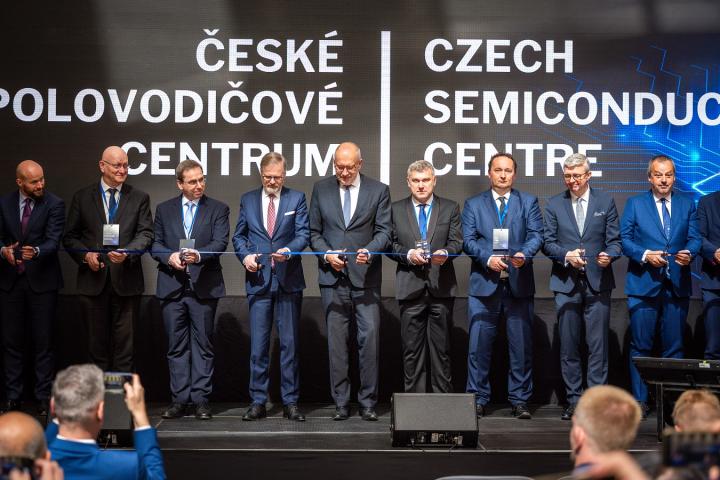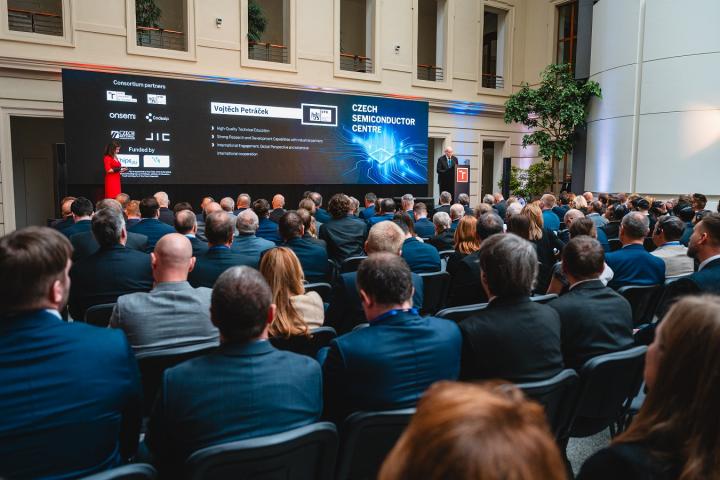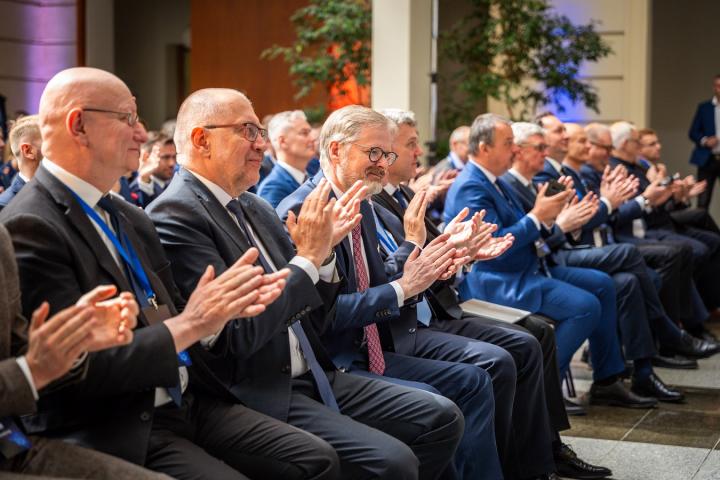
This is a key step for the Czech and European semiconductor sector. The establishment of the Centre fulfils the objectives of the National Semiconductor Strategy, which was created in view of the need to strengthen European and Czech self-sufficiency in the field of chips under the leadership of the Ministry of Industry and Trade in cooperation with the Government Office and the Ministry of Education, Youth and Sports. Among other things, its aim is to build a national competence centre and increase the number of experts, which the CSC will significantly contribute to. The implementation of the CSC is supported by the European initiative "Chips for Europe", which aims to strengthen technological capacity and promote innovation in the design and manufacture of advanced chips, thus contributing to the EU-wide objectives set out in the European Chip Act.
"The establishment of the Czech Semiconductor Centre is a strategic step for the future of our country. It is a key project, thanks to which the Czech Republic will maintain its competitiveness, as well as its security and technological sovereignty at a time when these values are being fought over globally. Thanks to this, the Czech Republic has all the prerequisites to play in the European league in this key sector," said Prime Minister Petr Fiala.
"The establishment of the Czech Semiconductor Centre is the result of systematic efforts of the members of the founding consortium, which lasted more than one and a half years. During this time, it was necessary to carefully profile the focus of the Centre in areas where the Czech semiconductor industry has the potential to compete successfully not only in Europe, but also globally. It was possible to concentrate, connect and align the interests of all those involved in the Czech semiconductor industry on the platform of the National Semiconductor Cluster. Whether it is industry, state administration, regions or universities, which have a difficult task - to ensure sufficient personnel capacity for the Czech semiconductor industry through its graduates, which the BUT is working hard on, for example by opening specialized study programs," said Ladislav Janíček, Rector of Brno University of Technology.
The BUT, for which semiconductors are an important strategic area, coordinated the preparation of the Czech Semiconductor Centre and will also be its headquarters for some time. "I appreciate immensely the constructive cooperation between the members of the consortium that accompanied the birth of the centre, but also the support that the intention to create the centre received from political representations, but also from the regions - especially the South Moravian Region. I am very pleased that the concept of the centre, which we are inaugurating today, is not just a mere compromise, but a true reflection of the professional potential and competence that we have in our country in the semiconductor field. Therefore, the centre has a real opportunity to contribute to strengthening the competitiveness of the Czech economy in this sector and to support the fulfilment of the objectives of the newly adopted National Semiconductor Strategy. This was developed in parallel with the preparation of the Centre with significant input from the members of its founding consortium. I would like to see projects based primarily on expertise and competence succeed in our country on the road to a value-added economy based on knowledge and innovation. Just as I believe the Czech Semiconductor Centre has done," added Ladislav Janíček.
The Czech Semiconductor Centre takes the form of a six-member consortium, which includes the two largest Czech technical universities - BUT and CTU, the companies onsemi and Codasip, the National Semiconductor Cluster (CNSC) and the innovation agency JIC. Funding for the first four years of the centre's operation is provided by the European Chips for Europe initiative and the Ministry of Education, Youth and Sports of the Czech Republic. "We also supported the establishment of the Czech Semiconductor Centre financially because we see it as an important step towards increasing the Czech Republic's competitiveness not only in the field of semiconductors but also in other key digital technologies. I believe that this support will strengthen cooperation between academia and industry and contribute to a better position of the Czech Republic in the European space," added Minister of Education, Youth and Sports Mikuláš Bek.
The Centre involves the Czech Republic in the emerging European network of competence centres. Similar Competence Centres will be established in all EU Member States and will play a key role in supporting SMEs in the field of semiconductor technologies. The Czech Semiconductor Centre will actively cooperate with other European Competence Centres, as confirmed by the Joint Statement on Competence Centres for Semiconductors issued by the Silicon Europe Alliance.
"I consider the launch of the Czech Semiconductor Centre a key step towards strengthening Europe's strategic independence. The covid-19 pandemic has clearly shown how vulnerable our economy can be when supplies from Asia are disrupted, disrupting entire supply chains. It is therefore essential to develop our own capacities and deepen cooperation between European countries. But equally important is intensive cooperation with democratic partners and global leaders outside the EU, such as the US, Taiwan, Korea and Japan, where we have made considerable efforts to strengthen relations. I believe that this project will contribute significantly to making the Czech Republic a partner of choice for research and innovation in this strategically important area," said Marek Ženíšek, Minister for Science, Research and Innovation, on the opening of the Centre.
The competence centre will provide qualified services according to the requirements of Chips for Europe in the field of chip design, especially for start-ups and small companies. It will provide private companies with mentoring, financial advice, access to pilot lines and a pan-European design platform. This will enable companies to develop new products faster and cheaper, facilitate testing and small-scale production.
Romano Hoffman, IMEC, Head of the Design Platform Consortium said, "I congratulate the distinguished members of the CNSC on the launch of the CSC, I am very much looking forward to creating many synergies between the CSC, the cluster and the Design Platform. We will work together to grow the European fabless design community."
CNSC participates in the National Semiconductor Strategy, the development of the Czech semiconductor ecosystem and its globalization, is part of Silicon Europe, semi.org. "The efforts of important members of CTU, BUT, Codasip, onsemi and other members of the cluster to use the Pillar I of the EU ChipsAct to strengthen the position of the Czech Republic in the field of chip design and to remove current barriers is crowned with success - the significant participation of the Czech Republic in the architecture of the pan-European design platform, but also in the coordination of the European network of competence centers, of which CSC is a part. We see the Pillar I as a great opportunity for further globalisation of cooperation not only for all cluster members, but also for the successful implementation of the objectives of the National Semiconductor Strategy," commented Stanislav Černý, President of CNSC.
JIC brings experience in developing an innovation ecosystem to the Czech Semiconductor Centre. "We have helped write the success stories of companies like Dynanic and Nenovision in the industry and now we want to support the creation of at least six new semiconductor startups, help companies attract investment for their development and facilitate knowledge transfer from universities. We consider this approach as the key to strengthening the competitiveness of the Czech Republic and Europe in the semiconductor industry" commented Petr Chládek, Director of the innovation agency JIC.
Another key task of the centre is to provide skilled workers for the semiconductor sector. The Centre will therefore focus on expanding and improving the range of education in chip design and manufacturing, deepening cooperation between universities and private companies, promoting talent and attracting new students to microelectronics and related fields. In this area, the Centre will work closely with the BUT and CTU, whose role is primarily to provide education in semiconductor and chip design in order to substantially strengthen the human resource capacity for the semiconductor industry in the Czech Republic.
"Semiconductors and chips are a very important and topical technology. CTU is developing its activities in this field both internationally and in the Czech Republic, and we see the preparation of experts for the semiconductor industry as one of the fundamental tasks," said CTU Rector Vojtěch Petráček. "The Czech Republic has excellent prerequisites to be an important European partner in this sector. High-quality research and the presence of world leaders in the field of semiconductors, such as onsemi or Codasip, give us the best opportunities for this," added Radek Holý, Vice Rector of CTU.
The specific focus of the centre is based on the existing specialization of the main players in the semiconductor industry in the Czech Republic, its profile reflects the unique position of onsemi, the largest semiconductor manufacturer in the Czech Republic, and Codasip, a leading developer of semiconductor design applications. "At onsemi, we are aware that deepening cooperation between industry and schools and research institutions not only makes sense, but is literally a necessity in today's modern world. It is necessary to show young people that technology and innovation are the engine of further development of the Czech Republic and to offer them quality technical education, which is the best investment in their own future. We have been working closely with universities for decades and we are ready to continue to support their further development, for example by involving our experts in the preparation of new fields of study and in teaching itself," said Aleš Cáb, Vice President of onsemi. "With the growing global demand for semiconductors, the European Union must take a leading role in this key sector to ensure technological sovereignty, economic growth and national security. By investing in research, development and partnerships, the Czech Republic can help reduce dependence on external suppliers and set a global standard for innovation. As a leading supplier of RISC-V (open standard for processor design), Codasip will make a strong contribution to the success of the Centre," added Karel Masařík, founder and Chief Innovation Officer of Codasip, who has also been selected as the Centre's Director.
The fact that the Czech Semiconductor Centre was established in South Moravia was appreciated by the regional director of the South Moravian Region Jan Grolich. "I am glad that the centre is being established in South Moravia. Thanks to Brno and its surroundings, we are among the most innovative regions in Europe - we have strong universities, top IT companies and, above all, people who know how to get things moving. Thanks to everyone who has made this happen."


Photo - BUT in Brno